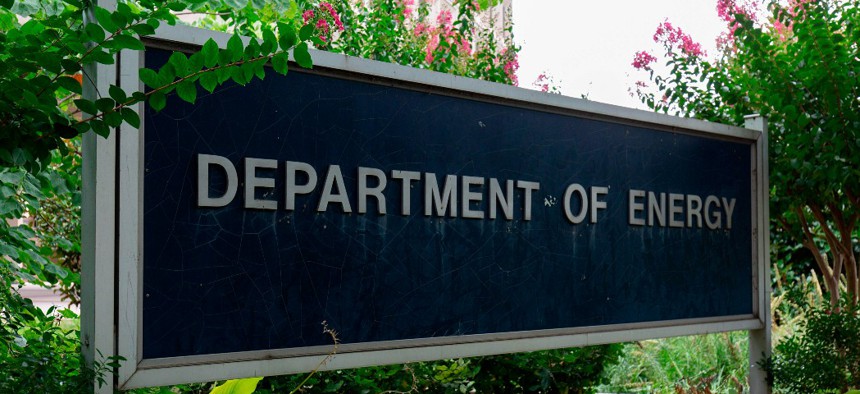Upcoming Department of Energy Playbook Aims to Guide Innovation 'in Big Ways'

ALASTAIR PIKE/AFP via Getty Images
Energy CIO Anne Dunkin discussed the agency’s vision for a broadly-applicable modernization playbook to help federal organizations strategically upgrade outdated technology.
Scalability is at the heart of the Department of Energy’s modernization playbook, a forthcoming publication that agency leadership hopes will be adopted by other public organizations as they work to overhaul the government’s technological infrastructure.
“We've got pockets of innovation, but what we don't have is sort of fully digitally transformed organizations, and we haven't figured out how to scale,” Ann Dunkin, the DOE chief information officer, told Nextgov. “We haven't broadly implemented that ability to scale transformation across organizations. So it's still happening in small ways instead of big ways.”
Discussing the ethos of the playbook, Dunkin said her agency’s approach is distinct from other modernization manuals in that it will focus on innovative scaling methodology.
“This follows that model of trying to create a playbook that will help us move from sort of islands of innovation in departments, agencies to modernizing across an entire agency,” Dunkin explained. “We're just starting to build out that playbook. Now, our goal is to use that to scale modernization the government.”
Dunkin is no stranger to large IT initiatives. She is currently serving in her second federal CIO position and worked as a member of the Technology Strategy & Delivery cross-agency team that guided the Biden-Harris presidential transition.
She said that the playbook will largely be composed of advice from interviews with modernization leaders in the private and public sectors. While it focuses on innovative scalability for all organizations, some other topics included in the playbook will be implementing low code platforms available throughout an organization as well as rapid authority to operate, or ATO, processes.
Energy’s approach to scalability is part of a broader federal initiative to upgrade dated technology within the public sector. Dunkin said that Energy’s focus is on how to innovate scalability efforts, mainly through reducing costs and imagining better blueprints to help other agencies seamlessly integrate modern platforms into their structure. The tips included in the publication will be more modern development approaches to digital transformation.
Some agencies have had a difficult time deploying new software systems, most notably the electronic health records designed by the Department of Veterans’ Affairs, which has suffered major delays and cost adjustments in recent years.
Energy’s playbook would ideally help remedy these kinds of situations.
She cited examples of other agencies deploying their own modernization products, such as the Air Force’s Software Factory Model, which is a series of pre-made platforms that provide various DevSecOp services to customers.
Dunkin said Energy’s mission regarding its playbook is to make it a similar product that helps agencies tailor intelligent scaling to their internal structure.
“We want to figure out how to help other departments…do that same sort of scaling where, you know, we can deliver innovation at a much higher scale more broadly, through the organization,” she said.
Other topics that will likely appear in the playbook are based on Energy’s current modernization efforts. Also included are potential lessons the agency has learned in working on adopting their own recommendations.
“We're going to be very challenged as we try and implement what we're suggesting are the ways to operate,” she said.
Customer experience on the civilian end will also be a topic covered by the playbook, but Dunkin noted that Energy’s services are different from more direct customer engagement like that of the Department of Veterans’ Affairs or the Internal Revenue Service.
To be broadly applied across departments, however, modernization strategies in Energy’s playbook will have a foundation of user experience needs.
“There may or may not be a play that's really focused on gathering…user input and engaging users. But that user experience piece is underlying the premise of what we're doing,” she said. “There is no point in delivering government services, if they are not what people need.”
Dunkin noted that the release of the book is unknown, but it should be published sometime within 2022.






